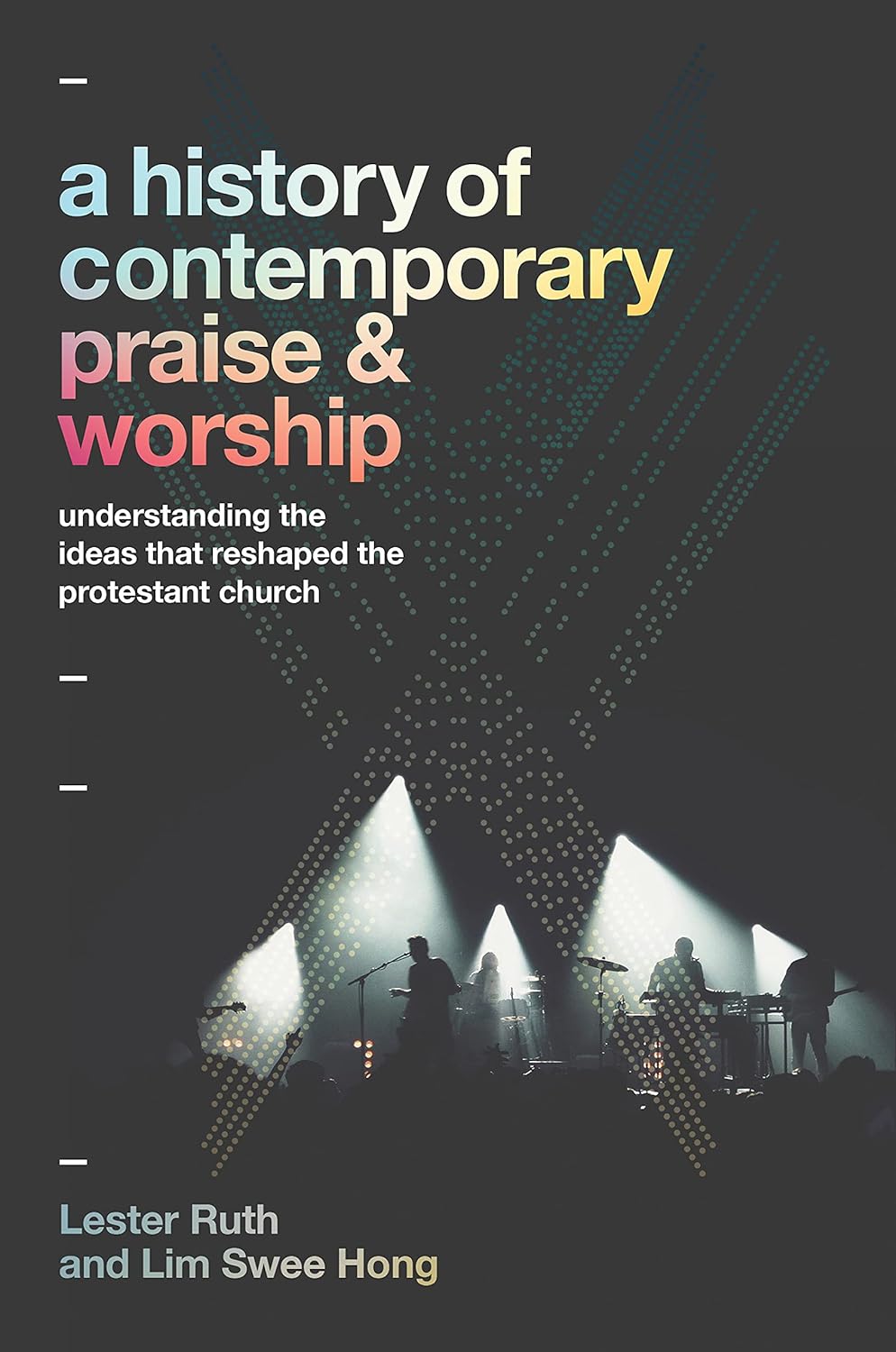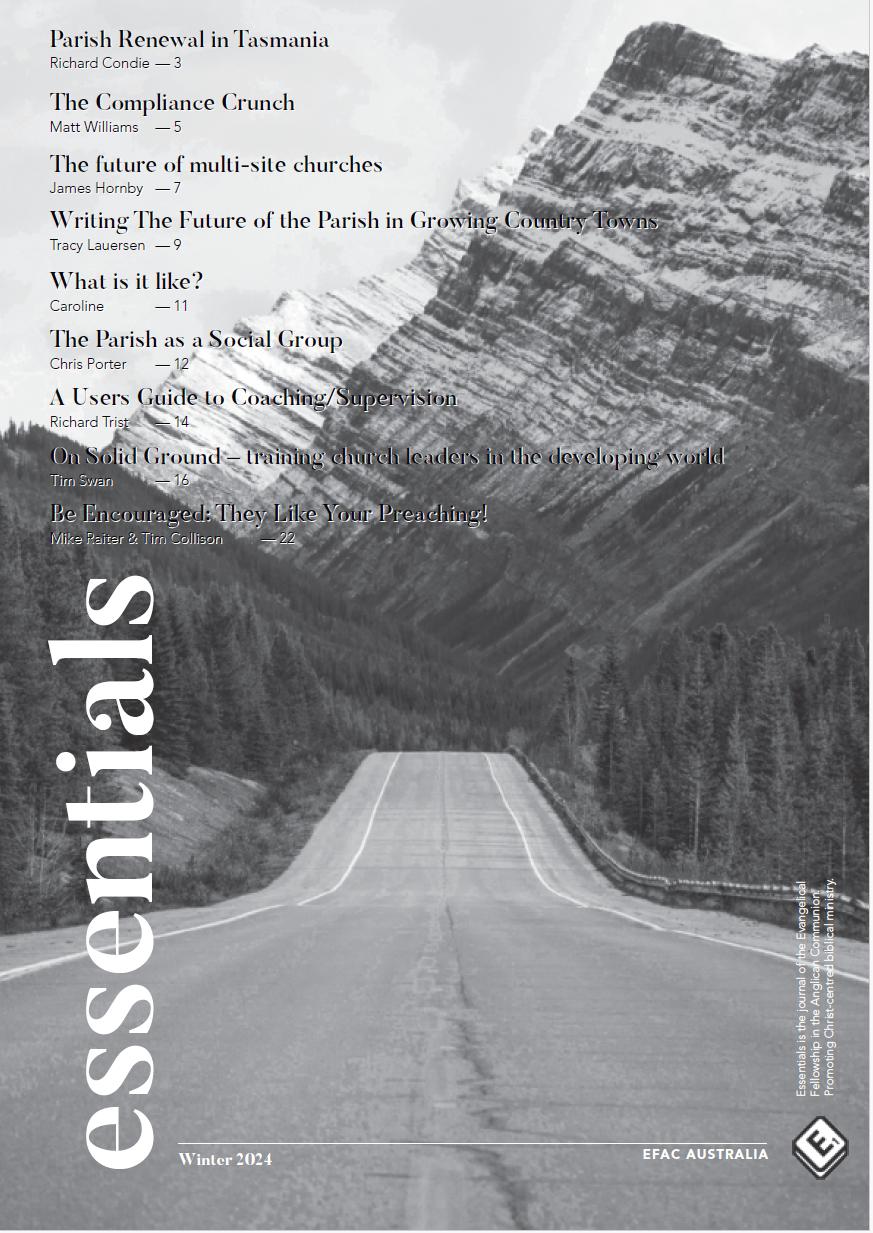Essentials
Editorial Winter 2024
- Details
- Written by: Stephen Hale
The Future Of The Parish
This edition of Essentials is focussed on this pressing question. In it we explore a range of dimensions to this big question. As we all know things aren’t all that great in many, many, parishes. Given the Anglican Church is structured around the parish what might the future look like. I have previously written in Essentials about the forthcoming Great Collapse in the Autumn 2023 Edition.
There are lots of great articles here and all is not gloom and doom. Alongside of the many struggling churches there are lots of great stories of renewal and change in lots of different contexts. In this edition we feature a Diocesan perspective as well as a look at a range of models of what’s happening on the ground.
We recently held the National Evangelical Anglican Conference in Sydney. It was a wonderful Conference, and we were greatly blessed by the ministry of Rev Charlie Skrine from All Soul’s Langham Place as our international guest speaker. We hope to feature some of the talks in future editions.
STEPHEN HALE, LOCATION, EDITOR
Essentials - Winter 2024
- Details
- Written by: Chris Porter
Essentials Winter 2024 pdf (2MB)
Essentials Autumn 2024 pdf (2MB)
Essentials Summer 2023 pdf (2MB)
Essentials Spring 2023 pdf (2MB)
Essentials Winter 2023 pdf (2MB)
Essentials Autumn 2023 pdf (2MB)
Essentials Summer 2022 pdf (8MB)
Essentials Spring 2022 pdf (4MB)
Essentials Winter 2022 pdf (4MB)
Essentials Autumn 2022 pdf (4MB)
Essentials Summer2021 pdf (3MB)
Essentials Spring 2021 pdf (3MB)
Essentials Winter 2021 pdf (3MB)
Essentials Summer 2020 pdf (3MB)
Essentials Spring 2020 pdf (1MB)
Essentials Winter 2020 pdf (1MB)
Essentials Autumn 2020 pdf (4MB)
Essentials Summer 2019 pdf (8MB)
Essentials Spring 2019 pdf (5MB)
Essentials Winter 2019 pdf (5MB)
Essentials Autumn 2019 pdf (5MB)
Essentials Summer 2018 pdf (5MB)
Essentials Spring 2018 pdf (5MB)
Essentials Winter 2018 pdf (5MB)
Essentials Autumn 2018 pdf (5MB)
Sing Lustily and with a Good Courage!
- Details
- Written by: Angela Chandler
 Sing Lustily and with a Good Courage! [i]
Sing Lustily and with a Good Courage! [i]
Growing your church through a welcoming music ministry
Most of my life has been spent in small to medium sized churches with limited resources and one main congregation catering for all ages. Although I have trained as a professional musician, one of my special areas of interest has been encouraging people to participate in communal music-making with whatever experience or skill they have. I have delighted in gathering together a community choir for carol services, hand drumming sessions at our after-school kids club, and nurturing the skills of young musicians in our church.
I am grateful for the reflections of some of the participants on their teenage experience in these activities over the years, which are included in this discussion.
Engaging the Heart & the Mind
- Details
- Written by: Alanna Glover and Philip Percival. © Emu Music
 Have you ever watched the musical, the Wizard of Oz? I once read about the characters of Tinman and Scarecrow being used to depict the divide that seems to exist in much of our contemporary church music[1]. In the story, Tinman has a brain, but not a heart; Scarecrow has a heart but not a brain; and so they follow the yellow brick road in order to find their missing pieces. Contemporary congregational music is often thought of in the same way. Some songs are ‘Tinman’ songs, they are rich in theology but fail to engage people’s emotions. Others are ‘Scarecrow’ songs that are emotive or catchy, but lack theological depth and end up stirring people through their melodies and experience rather than Biblical truth.
Have you ever watched the musical, the Wizard of Oz? I once read about the characters of Tinman and Scarecrow being used to depict the divide that seems to exist in much of our contemporary church music[1]. In the story, Tinman has a brain, but not a heart; Scarecrow has a heart but not a brain; and so they follow the yellow brick road in order to find their missing pieces. Contemporary congregational music is often thought of in the same way. Some songs are ‘Tinman’ songs, they are rich in theology but fail to engage people’s emotions. Others are ‘Scarecrow’ songs that are emotive or catchy, but lack theological depth and end up stirring people through their melodies and experience rather than Biblical truth.
A Plea for a Greater Variety of Songs and Hymns!
- Details
- Written by: Stephen Hale
 One of the dilemmas for those involved in organising and designing Sunday services is the lack of variety of content when it comes to contemporary song selections. There are many great contemporary songs, and we should be very thankful for those who compose and write these songs. There are also some excellent reimaginings of old classics that work beautifully with a range of demographics. At the same time, one would have to suggest that there are a disproportionate number of songs that focus on adoration and many others that focus on the death of Jesus. In any worship services we should sing songs of adoration and we should reflect on the death of Jesus. It would be strange if we didn’t. At the same time there are a range of things which we should also sing about and it’s often very hard to find songs that reflect this. I’ve been involved in services where every song seemed to focus, more or less, on the same thing! If we only sing about one area we run the risk of it becoming so familiar that it just washes over us.
One of the dilemmas for those involved in organising and designing Sunday services is the lack of variety of content when it comes to contemporary song selections. There are many great contemporary songs, and we should be very thankful for those who compose and write these songs. There are also some excellent reimaginings of old classics that work beautifully with a range of demographics. At the same time, one would have to suggest that there are a disproportionate number of songs that focus on adoration and many others that focus on the death of Jesus. In any worship services we should sing songs of adoration and we should reflect on the death of Jesus. It would be strange if we didn’t. At the same time there are a range of things which we should also sing about and it’s often very hard to find songs that reflect this. I’ve been involved in services where every song seemed to focus, more or less, on the same thing! If we only sing about one area we run the risk of it becoming so familiar that it just washes over us.
Book Review: A History of Contemporary Praise and Worship:
- Details
- Written by: Rhys Bezzant
 A History of Contemporary Praise and Worship: Understanding the Ideas that Reshaped the Protestant Church
A History of Contemporary Praise and Worship: Understanding the Ideas that Reshaped the Protestant Church
Lester Ruth and Lim Swee Hong
Grand Rapids: Baker Academic, 2021
Reading this book was like listening to the soundtrack of my earliest years as a Christian in the 1970s. It tells the story of the rise and development of contemporary praise and worship – some of it much earlier than the decade of my conversion! – with lots of quotations from songs, and references to their composers or publishers. But recounting this story is not just about listing choruses. In the hands of Ruth and Hong, we discover the social and the theological pressures which generated a twentieth-century revolution in both musical performance and song-writing. Their focus is on the United States, but their analysis holds good for Australia as well. The authors are professors in the field of Christian worship, so this book was the result of painstaking research – mainly through personal interviews – over many years. Contemporary Christian music has deep and complicated roots.
Read more: Book Review: A History of Contemporary Praise and Worship:
Bible Study: Ephesians 1:3–14
- Details
- Written by: Mark Simon
The main feature of the opening to Paul’s letter to the Ephesians is praise. Verses 3–14 are described by commentators as a thanksgiving, a eulogy, a hymn of praise or an extended blessing (a berakah in Hebrew, declaration of blessing, such as found in Psalm 103). The tone is exuberantly thankful and the content is theologically rich. As such, it represents a model for sung worship in the gathered church. In this study, we’ll explore the variety of ways in which Eph 1:3–14 informs and models how we might praise God in corporate song.
Observing the structure of the passage, we note the prominence given to each person of the Trinity. There is specific mention of “God our Father” (v. 2), “the God and Father” of Jesus (v. 3); Jesus/Jesus Christ/Christ (vv. 2, 3, 5, 6 ‘the Beloved One’, 10, 12); and the Holy Spirit (vv. 13–14). The qualities of God’s triune character particularly emphasized in this passage are: his sovereign election of a people who are made holy through redemption, adoption, and sealing with the Spirit (vv.5, 7, 13–14); God’s gracious initiative in this plan for salvation (vv. 4, 6, 7); and God’s love as the motivator of his actions (vv.4–5). Paul highlights in turn God the Father as sovereign over salvation history (vv. 4, 5, 10, 11), Christ as agent of redemption (v.7), and the Spirit as eschatological seal in this rich passage (vv.13–14). The trinitarian nature of Paul’s hymn of praise should encourage us to sing songs to Father, Son and Spirit – celebrating their comprehensive work that secures salvation, not neglecting any person of the Trinity as the object of our worship.

